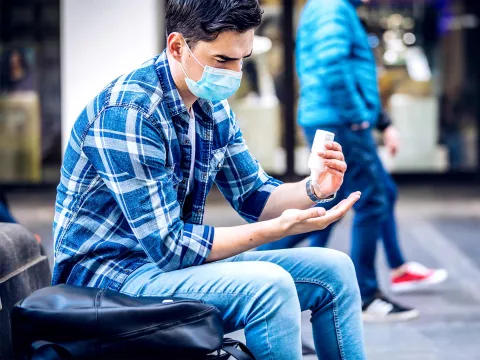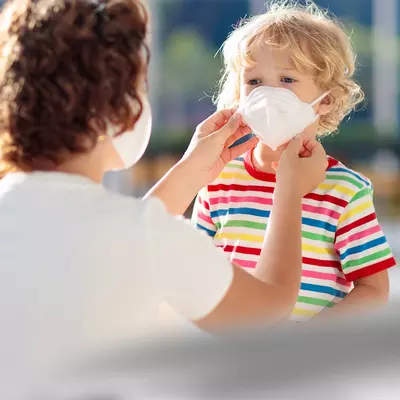- AdventHealth

As the country gradually eases stay-at-home orders and prepares to reopen, it’s natural to feel anxious. The White House and the Centers for Disease Control and Prevention (CDC) have released joint guidelines for Opening Up America Again, and many areas are starting to do just that.
The phased opening guidelines are specifically designed to reduce the risk of a COVID-19 resurgence. Still, as eager as you may be to get back to the gym or your favorite coffee shop, we understand you may be worried about a second surge and the possibility of having to stay home again. Here are some ways to manage your fears as the country begins to reopen.
Stay Informed, But in Moderation
Gathering trustworthy information about the reopening of America can help you accurately determine your risk so you can take reasonable precautions. During the first two of the three stages, for example, you’ll want to continue sheltering in place if you’re elderly or have a serious underlying health condition, like:
-
A compromised immune system due to chemotherapy or other causes
-
Asthma or chronic lung disease
-
Diabetes
-
Liver disease
-
Kidney disease treated with dialysis
-
High blood pressure or serious heart conditions
-
Obesity
Still, know your personal limits for all the news coming at you. The CDC recommends taking breaks from watching, reading or listening to upsetting news. Watch out for social media, too, where opinions can sometimes blur facts.
Control What You Can to Help Ease Anxiety
While it may feel like a lot of things are out of your control right now, there’s a lot you can take charge of in your life help ease your anxiety, such as helping others, fixing things around the house, organizing your closet, baking bread or listening to music.
Find more ideas in these posts:
And don’t neglect your physical health, either. Self-care is as important as ever. The World Health Organization (WHO) recommends maintaining a healthy lifestyle through:
-
Exercise
-
Proper diet
-
Sleep
-
Staying in touch with family and friends
Continue Safety Practices
Good hygiene is always a good idea. The Opening Up America Again guidelines recommend that you continue these throughout all three phases:
-
Avoid touching your face
-
Frequently disinfect high-touch items and surfaces
-
Sneeze or cough into a tissue or the inside of your elbow
-
Strongly consider using a face covering when in public, especially when using mass transit
-
Wash your hands with soap and water or use hand sanitizer
Note that some states, counties and towns may have stricter rules requiring you to cover your face with a cloth mask in public.
Social distancing is still advised, as well, particularly in the first two phases of the plan to reopen. Whether you’re shopping, at the park having a picnic or in an outdoor recreation area, you’ll need to stay at least 6 feet away from others. Although social distancing may have taken some getting used to, it continues to be one of the best ways to slow the spread of the virus.
Cultivate Your Sense of Hope
While you’re venturing out more, consider keeping a journal to help ease your anxiety, such as a notebook to write down what you’re grateful for. Maybe it’s your health or the health of your loved ones. Or it could be as simple as being able to meet a friend in person for lunch, which is possible as early as phase one of the reopening plan.
Seek Support if You Need It
How are you handling the gradual lifting of the restrictions on daily life? You may have mixed emotions. Or, it may be hard to tell. The CDC suggests being on the lookout for common signs of distress.
Contact your health care provider if you experience any these behaviors or feelings for several days in a row and they make daily life difficult:
-
Changes in appetite, energy and activity levels
-
Difficulty concentrating
-
Difficulty sleeping or nightmares
-
Feeling angry or short-tempered
-
Feelings of numbness, disbelief, anxiety or fear
-
Increased use of unhealthy substances
-
Physical reactions, such as headaches or skin rashes
-
Worsening of chronic health problems
If you have a diagnosed mental health condition, like an anxiety disorder or major depression, be sure to continue with your treatment plan and monitor yourself for any new symptoms. Schedule an online or in-person office visit with your care provider if new symptoms develop.
For All Your Health Care Needs, We’re Ready When You’re Ready
Nothing is more important to us than your safety, and we’re ready to care for you safely in person, when you’re ready. To keep you and your family safe, we’ve made some important changes at all of our facilities, including mandatory temperature checks, masks for everyone and redesigned waiting rooms that facilitate social distancing. To learn more about how we’re keeping you protected and safe, visit AdventHealth.com.



